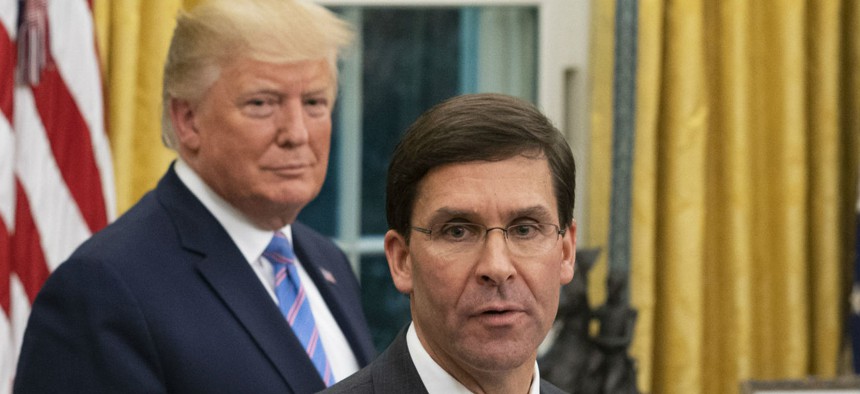
President Trump and Defense Secretary Mark Esper at the White House in July 2019. Official White House Photo by Joyce N. Boghosian
White House Memo Could End Unionization at the Pentagon
In a January memo, President Trump authorized Defense Secretary Mark Esper to exempt the Defense Department from the law governing collective bargaining in the federal government.
President Trump signed a memo last month that could pave the way for his administration to outlaw collective bargaining by the Defense Department’s 750,000-person civilian workforce.
According to a January 29 memo obtained by Government Executive entitled “Delegation of Certain Authority under the Federal Service Labor-Management Relations Statute,” Trump gave Defense Secretary Mark Esper the authority to exclude Pentagon “agencies or subdivisions thereof” from the law guaranteeing federal workers the right to unionize, citing the need for “flexibility.”
“When new missions emerge or existing ones evolve, the Department of Defense requires maximum flexibility to respond to threats to carry out its mission of protecting the American people,” the document states. “This flexibility requires that military and civilian leadership manage their organizations to cultivate a lethal, agile force adaptive to new technologies and posture changes. Where collective bargaining is incompatible with these organizations’ missions, the Department of Defense should not be forced to sacrifice its national security mission and, instead, seek relief through third parties and administrative fora.”
The Civil Service Reform Act of 1978 includes a provision allowing the president to issue an order excluding agencies and agency subcomponents from collective bargaining rules if the rules “cannot be applied to that agency or subdivision in a manner consistent with national security requirements.” But since its enactment, no president has exercised that power over the Defense Department.
It is unclear how widely Esper would use this new authority. Although there are questions about how the government would treat civilian employees of the new U.S. Space Force, lawmakers made clear that those employees will have Title 5 protections when Congress passed the fiscal 2020 National Defense Authorization Act.
According to a 2019 Politico article, taking away union representation from all Defense workers has been a longtime goal of some in the White House: in 2017, James Sherk, a member of the Domestic Policy Council, penned a 19-page memo advocating for policies to weaken organized labor. One such proposal encouraged Trump to sign an executive order “eliminating employee unions at the Defense Department on the basis of national security.”
Unionized workforces within the Defense Department vary widely. Civilian workers at the U.S. Coast Guard are represented by the American Federation of Government Employees, as are the Defense Logistics Agency and the Defense Contract Management Agency. Blue collar workers at military bases and depots across the country are represented by a variety of unions, and teachers at on-base schools for children of service members bargain collectively as well.
In a statement, AFGE National Secretary-Treasurer Everett Kelley called the memo disgraceful.
“Denying nearly half a million Defense Department workers the collective bargaining rights guaranteed to them by law since 1962 would be a travesty—and doing it under the guise of ‘national security’ would be a disgrace to the sacred oath and obligation that all federal workers make to their country," Kelley said. "This administration will not stop until it takes away all workers’ rights to form and join a union, and we will not stop doing everything we can to prevent that from happening.”
Federal News Network reported Friday that on Jan. 31, two days after the memo is dated, Defense Assistant Secretary for Readiness Veronica Daigle, the principal staff advisor to the Defense secretary and the under secretary for personnel and readiness, resigned from her position after only seven months on the job.
The White House did not immediately respond to a request for comment Saturday.







